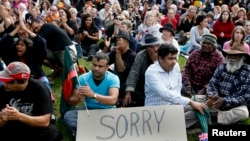For the first time, a museum in Australia is telling the stories of the massacres by colonists of indigenous people from an Aboriginal perspective. Thousands of First Nation people are believe to have been killed by white settlers until the 1940s, but much of that history is yet to be uncovered.
Near the city of Portland is the site of the oldest known massacre of indigenous people in the Australian state of Victoria.
There was tension in the early 1830s between European settlers, who had set up a whaling station, and a local Aboriginal tribe over a whale carcass. The precise details of the confrontation have been hard to establish, but 60 to 200 First Nation people were killed in what is known as the Convincing Ground massacre.
The killings are part of a series of stories being told in a new exhibition at the Melbourne Museum. Called “Black Day, Sun Rises, Blood Runs,” the multimedia show is included in the museum’s Bunjilaka Aboriginal Cultural Center.
Indigenous stories
The stories are told by indigenous people who have been filmed at the sites of several massacres.
Officials say the testimony tries to fill gaps in the documentation of the killings contained in court proceedings, newspaper reports and Aboriginal records.
Curator Genevieve Grieves says the exhibition contains valuable historical information.
“We are going quite deeply into six narratives that include massacre, they include resistance, they include the native police, who were used against Aboriginal people in Victoria and other parts of the country,” she said, “And we are really doing that through first-person voice. So we are just talking to people connected to those spaces and so we have got what is on the historical record, but also what is contained in memory as well, in indigenous memory and, indeed, in non-indigenous memory as well.”
Grieves says this is the first time a new permanent exhibition at an Australian museum has detailed the stories of the massacres from an indigenous perspective.
Thousands massacred
According to the University of Newcastle in New South Wales, about 1,200 indigenous people in Victoria state died in 40 massacres from the 1830s to the 1850s. Academics say that armed white settlers or farmers would ambush Aboriginal camps in the night or early morning.
In July, an online map marking the massacres of Aboriginal clans across Australia’s colonial frontier was launched. It detailed more than 150 sites where violent attacks against indigenous groups took place in eastern Australia following the arrival of European settlers in the late 1700s.




